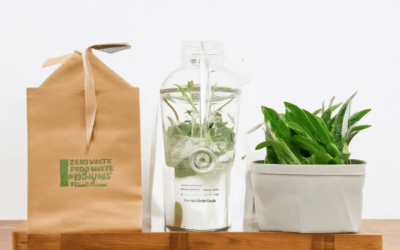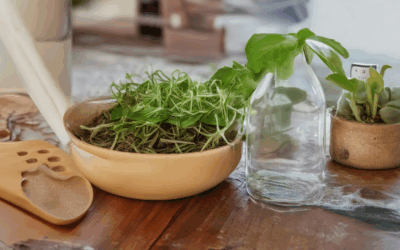As the world increasingly turns its focus toward sustainability, the demand for plastic-free alternatives has grown significantly. More consumers are seeking ways to reduce their reliance on single-use plastics, driven by concerns over environmental pollution, resource depletion, and health impacts. Whether it’s in everyday household items, packaging, or industrial applications, the quest for alternatives to plastic has never been more urgent. From biodegradable materials to innovative substitutes like metal and wood, there’s a growing array of options to consider. This comprehensive guide explores the latest trends, top alternatives, and practical strategies for embracing a plastic-free lifestyle, offering insights into how you can make sustainable choices that align with your values and contribute to a healthier planet. By examining the benefits and challenges of various alternatives, this article aims to equip readers with the knowledge needed to transition toward a more eco-conscious future.
Key Takeaways
- Top Plastic-Free Alternatives: Discover substitutes like glass, metal, biodegradable materials, paper/cardboard, and hemp/jute for everyday plastic use.
- Future of Plastic Replacement: Biodegradable materials, glass, paper/paperboard, and natural textiles are leading the charge as sustainable alternatives.
- Global Efforts: A unified treaty aims to tackle plastic pollution, marking a significant step toward reducing its environmental impact.
- Sustainable Habits: Adopt eco-friendly lifestyles by minimizing single-use plastics, choosing sustainable products, and supporting brands with recyclable packaging.
- Practical Steps: Transition to a plastic-free life with reusable items, upcycling, cloth alternatives, and reducing reliance on plastic water bottles and packaging.

Alternatives to Plastic
Eco Planeta Verde explores various alternatives to plastic that offer sustainable solutions for everyday life.
- Metal: Durable and recyclable, metals like aluminum and steel are excellent replacements for plastic in packaging and construction.
- Glass: Reusable and non-toxic, glass is ideal for containers, bottles, and cookware due to its high heat resistance.
- Wood: A natural and biodegradable material, wood can replace plastic in furniture, flooring, and packaging.
- Bamboo: Lightweight and fast-growing, bamboo is a great alternative for items like utensils, flooring, and clothing.
- Ceramics: Heat-resistant and long-lasting, ceramics are perfect for kitchenware and bakeware.
- Paper: Used widely for single-use items like plates, cups, and tissues, paper is biodegradable and recyclable.
- Cloth: Breathable and reusable, cloth is a sustainable choice for bags, towels, and cleaning cloths.
- Bioplastic: Made from renewable resources like cornstarch, bioplastic is a plastic alternative that decomposes naturally.
To choose eco-friendly products, look for certifications like FSC or Forest Stewardship Council and check for recyclability ratings. Reducing single-use items and opting for reusable options can significantly lower plastic consumption.
How to Be 100% Plastic-Free
Eliminating plastic from our lives may seem daunting, but it’s entirely achievable with mindful effort and sustainable habits. Here’s a comprehensive guide to help you transition to a plastic-free lifestyle:
1. Reduce Plastic Use in Daily Life
- Minimize Single-Use Plastics: Avoid using disposable items like water bottles, straws, and plastic cutlery. Invest in reusable alternatives.
- Choose Reusable Containers: Use glass containers for food storage and drinkware. Opt for cloth bags over plastic ones for grocery shopping.
- Reduce Waste: Separate recyclables and compostables to minimize landfill contributions. Consider participating in local recycling programs or composting initiatives.
2. Shop Thoughtfully
- Support Sustainable Brands: Look for products made from natural materials like bamboo, cotton, or hemp. Many eco-conscious brands offer high-quality, plastic-free alternatives.
- Buy Bulk: Purchase grains, nuts, and other dry goods in bulk to reduce packaging waste. Bring your own containers to local stores for refills.
- Local and Seasonal: Prioritize fresh, locally-sourced foods that come with minimal packaging. Farmers’ markets are great places to find these options.
3. Declutter Your Home
- Identify Plastic Items: Go through your belongings and separate plastic items from the rest. Donate or recycle items you no longer need.
- Replace Plastic Products: Swap out plastic toys, kitchen utensils, and electronics for eco-friendly alternatives like stainless steel, wood, or biodegradable materials.
- Invest in Quality: Purchasing durable, long-lasting items reduces the need for frequent replacements, which often come in plastic packaging.
4. Reduce Food Packaging
- Bring Your Own Containers: When purchasing food, bring your own containers or buy from businesses that package products in recyclable or compostable materials.
- Join Zero-Waste Groups: Some communities offer zero-waste stores where you can fill your own containers with bulk goods. Check if there’s one near you.
- Cook from Scratch: Preparing meals at home reduces reliance on plastic-packaged snacks and frozen meals.
5. Advocate for Change
- Support Bans and Restrictions: Stay informed about local efforts to ban single-use plastics and advocate for stricter regulations in your area.
- Spread Awareness: Share information about the environmental impact of plastic and encourage others to adopt plastic-free habits.
- Engage with Local Governments: Participate in public meetings or sign petitions to push for policies that promote plastic reduction.
Discover ways to educate yourself and others about plastic pollution .
6. Build a Community
- Join Plastic-Free Groups: Connect with local or online communities focused on plastic reduction to share tips and stay motivated.
- Host Workshops or Events: Organize workshops on plastic-free living to inspire others in your community.
- Collaborate with Others: Team up with friends, family, or neighbors to reduce plastic use collectively.
By taking these steps, you can significantly reduce your plastic consumption and contribute to a healthier planet. Remember, every small change makes a difference!

What is the Japanese alternative to plastic?
Eco Planeta Verde explores innovative solutions to reduce reliance on traditional plastics, with Japan leading the way in developing alternative materials. Here are some notable Japanese alternatives to plastic:
-
Mitsubishi Chemical Corporation’s Plastics-to-Fuel Technology
Mitsubishi Chemical has developed a unique method to convert plastic waste into fuel. This process not only reduces the volume of plastic waste but also helps in energy recovery, promoting a circular economy. Learn more about Mitsubishi Chemical’s innovative solutions
-
Bio-degradable Plastics
Japanese researchers have been working on bio-degradable plastics made from renewable resources. These materials break down naturally, reducing the environmental impact compared to conventional plastics. Explore TotalEnergies Corbion’s biodegradable plastics
-
Plant-based Plastics
Nippon Gypsum Manufacturing Co., Ltd. produces bioplastic films using agricultural waste such as rice husks. This innovative approach transforms waste into useful materials, supporting sustainability goals. Discover Nippon Gypsum’s sustainable solutions
-
Edible Packaging
Japan is also exploring edible packaging solutions, particularly through seaweed-based products. Companies like Seaweed Innovations are developing packaging that can decompose naturally, eliminating the need for plastic wrappers. Learn about seaweed-based packaging innovations

Best Substitutes for Plastic
Eco Planeta Verde advocates for sustainable living, encouraging the use of eco-friendly alternatives to reduce plastic consumption. Here are some of the best substitutes for plastic:
- Glass : Ideal for reusable bottles, jars, and containers. Glass is durable, non-toxic, and fully recyclable.
- Metal : A great substitute for plastic in food storage containers, cans, and kitchenware. Metal is rust-resistant and can be recycled indefinitely.
- Biodegradable Materials : Products made from plant-based materials, such as compostable packaging, are excellent alternatives for single-use plastics. These materials break down naturally and can be disposed of in compost bins.
- Paper and Cardboard : Perfect for packaging, mailing, and creating disposable items like plates and utensils. Paper products are biodegradable and widely recyclable.
- Hemp and Jute : Natural fibers like hemp and jute can replace plastic in ropes, bags, and fabric production. These materials are strong, eco-friendly, and require less resource input compared to traditional plastics.
Eco Planeta Verde encourages exploring these alternatives to contribute to a more sustainable lifestyle. By reducing reliance on plastic, we can protect our environment and promote a healthier planet for future generations.
What Will Replace Plastic in the Future?
Plastic has been a cornerstone of modern society, but its widespread use has raised significant environmental concerns. As awareness grows, industries are racing to find sustainable alternatives that can replace traditional plastics. Here’s a breakdown of potential replacements and the steps being taken to transition away from plastic:
Biodegradable Materials
Biodegradable materials are among the most promising alternatives to conventional plastics. These materials break down naturally through microbial action, reducing their environmental footprint. Examples include:
- Starch-Based Plastics: Made from agricultural byproducts like cornstarch, these plastics can be composted and returned to the earth.
- Polylactic Acid (PLA): Derived from sugars, PLA is already used in packaging and textiles and can be composted effectively.
- Cellulosic Plastics: Made from wood pulp, these materials are strong and biodegradable, making them ideal for various applications.
Innovative Alternatives
Beyond bioplastics, other materials are emerging as viable replacements:
- Glass: Glass is durable, non-toxic, and can be recycled indefinitely. It’s already being used in food containers and beverage bottles.
- Paper and Paperboard: Lightweight and biodegradable, paper products can replace plastic in packaging and single-use items.
- Natural Textiles: Hemp, jute, and banana fibers are strong and biodegradable, making them excellent substitutes for synthetic materials.
Global Initiatives
Major efforts are underway to accelerate the shift away from plastic. In March 2022, 175 countries signed a global treaty to combat plastic pollution, signaling a unified approach to reduce reliance on plastic.
Eco-Friendly Solutions
Eco Planeta Verde advocates for sustainable living, encouraging readers to adopt greener habits and explore eco-friendly products. By supporting brands that prioritize sustainability, individuals can contribute to the reduction of plastic waste.
For more information on sustainable living and eco-friendly alternatives, visit our Sustainable Living section. Learn about practical tips and resources to make a positive environmental impact today!

“`html
How to Go Non-Plastic
Reducing plastic use in our daily lives can seem overwhelming, but small changes can make a big difference. Here are some practical steps to help you transition to a plastic-free lifestyle.
Top Tips for Reducing Plastic Usage
- 1. Reduce Single-Use Plastics: Minimize items like plastic bottles, straws, and disposable utensils. Invest in reusable alternatives like stainless steel water bottles and bamboo utensils.
- 2. Choose Sustainable Products: Opt for products made from recycled materials or biodegradable options. Look for certifications like FSC or Forest Stewardship Council for wood products.
- 3. Ditch Plastic Packaging: Support brands that use recyclable or compostable packaging. Many online stores offer bulk purchasing options to reduce plastic waste.
- 4. Upcycle Old Plastics: Don’t throw away old plastic items. Instead, find creative ways to repurpose them, such as making DIY household products or art projects.
- 5. Use Cloth Alternatives: Switch to cloth napkins, menstrual cups, and reusable cloths instead of paper or disposables. These items last longer and reduce landfill waste.
- 6. Avoid Plastic Water Bottles: Carry a reusable bottle with you wherever you go. Many cities now offer refill stations to help you stay hydrated without plastic.
- 7. Reduce Plastic in Personal Care: Choose toothpaste tablets, solid shampoo bars, and hair care products packaged in glass or metal. These options are just as effective but plastic-free.
- 8. Support Local Initiatives: Get involved with local clean-up drives or beach cleanups. Many communities host events to raise awareness about plastic pollution.
- 9. Educate Yourself: Learn about the environmental impact of plastic and share this knowledge with others. Awareness helps drive change and encourages others to join the movement.
- 10. Use Digital Tools: Download apps like Ecosia, which plants trees using your search history. Or use apps to track your plastic usage and set goals to reduce it.
Additional Resources for a Plastic-Free Lifestyle
Eco Planeta Verde offers a wealth of resources to help you adopt a plastic-free lifestyle. Explore our sustainable living tips and learn how to create a zero-waste kitchen. Join our community to share ideas and stay motivated on your journey.
For more information on reducing plastic waste, visit our plastic pollution page. Together, we can make a difference for future generations.
Conclusion
Going plastic-free isn’t just about individual actions—it’s a collective effort. By making small changes today, you can contribute to a healthier planet for tomorrow. Let’s all work together to reduce plastic use and create a more sustainable world.
“`




0 Comments